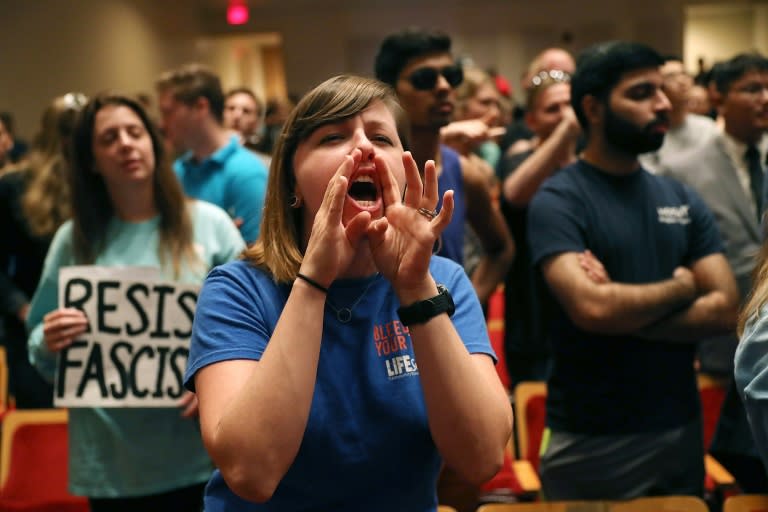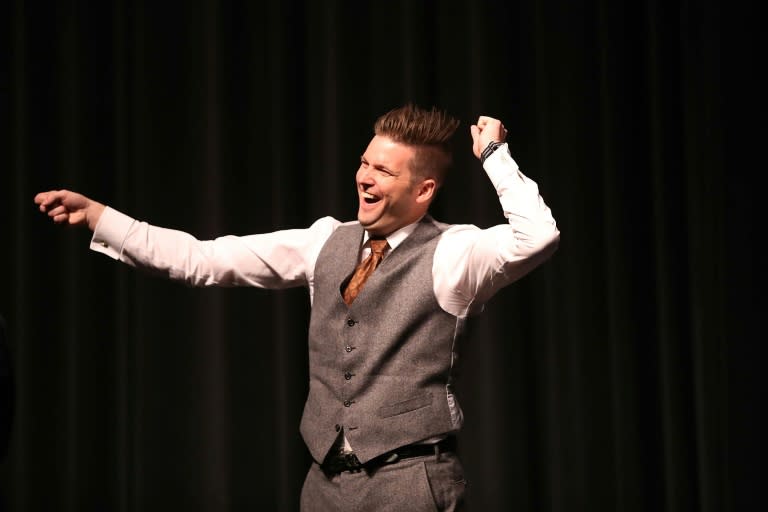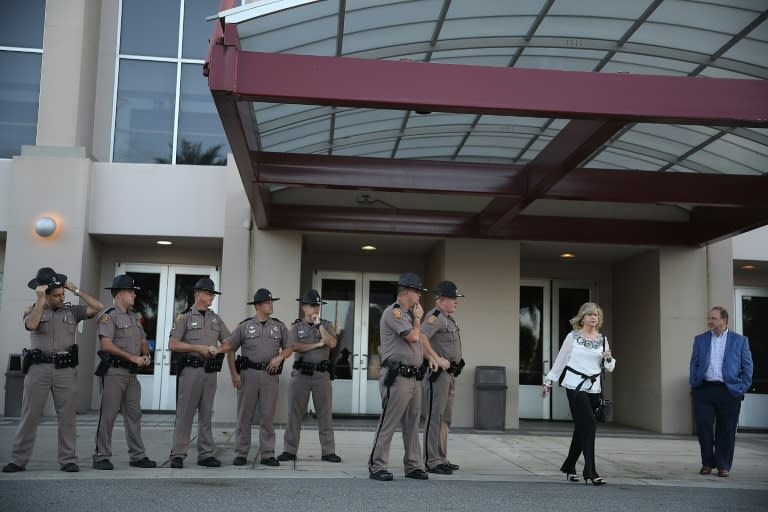White supremacist shouted down at Florida college speech
Hundreds of protesters shouted down white supremacist leader Richard Spencer on Thursday at a university in Florida, forcing him to leave the stage without delivering his planned speech. Officials were so fearful of disturbances that Governor Rick Scott declared a state of emergency ahead of the speech by Spencer, an organizer of a white supremacist rally that erupted in deadly violence in Charlottesville earlier this year. The order enabled the governor to bring in law enforcement personnel from across the state to keep order in the town of Gainesville. Only around 30 supporters of the controversial white nationalist made it into the University of Florida auditorium, massively outnumbered by protesters who chanted "No more Spencer!" Spencer has gained notoriety as a leader of the "alt-right" movement, a loose collection of white supremacist and neo-Nazi groups that staged the incendiary protest in Charlottesville, Virginia in August. A 32-year-old woman was killed when a Nazi sympathizer plowed his car into counter-protesters, and two police officers died in a helicopter crash as they were responding to the violence. As he stepped onto the stage, Spencer was greeted with a chorus of angry and profanity-laced jeers and chants, drowning out his voice. "This is a great greeting," he said. "Thank you for the welcome. Are you ready to talk?" People stood up, raising their right hands into fists and chanting "No more Spencer! No more Spencer!" "Are you gonna keep this up the whole night?" Spencer said, describing himself as a "dissident intellectual." "You sent your message! Why don't we have a conversation?" said the 39-year-old. "So you don't believe in free speech at all, do you?" "You are cowardly trying to shut down a movement that is growing and it's going to stand up for white people", Spencer yelled at the crowd. In Gainesville, streets surrounding the University of Florida were blocked off to traffic on Thursday, and classes were canceled at the Philips Center, where the Spencer attempted to speak. Authorities barred people inside and near the site from carrying a long list of items, including shields, umbrellas, water bottles and backpacks. - State of emergency - Protesters opposed to Spencer's arrival unfurled signs on several campus buildings that read "Love, not hate." Chalk markings on concrete walkways carried messages supporting diversity. Under the hashtag #TogetherUF, student leaders called for an online "virtual assembly" to counter people arriving to hear Spencer's speech. "We want to take the spotlight away from the controversial speaker and make headlines with the amazing things our diverse student body does together," said one of the organizers, student Bijal Desai. Spencer is "one of the leaders of the white nationalist movement and he coined the expression 'the alt-right' so he has a lot of influence," Lecia Brooks, outreach director for the Southern Poverty Law Center, an NGO that monitors hate groups, told AFP. The SPLC considers Spencer's group, the National Policy Institute, to be a hate group. Fearing a repeat of the Charlottesville violence, Scott had issued an emergency declaration for the whole of Alachua county, where Gainesville, population 130,000, is located. "We live in a country where everyone has the right to voice their opinion. However, we have zero tolerance for violence and public safety is always our number one priority," Scott said, adding that local authorities had asked for help. The University of Florida agreed to host Spencer in the name of free speech, but said he was not invited to give the talk. Spencer's group paid $10,564 to rent the space on campus, but the school will have to pay as much as $500,000 to boost campus security. Brooks, however, scoffed at what she saw as the "over-militarization" of Gainesville. Scott gave Spencer's speech "tremendous attention by calling a state of emergency in advance of the whole event. It's kind of ridiculous," she said. The university's Black Student Union had warned protesters to be cautious. "If you choose to protest, it is imperative that you utilize sound judgment with every action that you take and not be provoked to resort to violence," it said in a statement. "We will overcome. This experience will only further unite us and constructively focus our energies into creating a better society for future generations."




